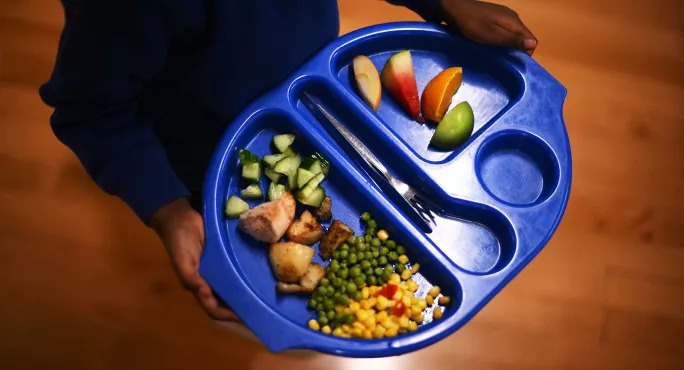7 in 10 pupils on universal credit not eligible for free school meals

There are 1.7 million pupils whose families receive universal credit but who are not eligible for free school meals, the Institute for Fiscal Studies (IFS) has highlighted today.
In a new report, which examines options and trade-offs for expanding free school meals in England, the IFS also warns that per-meal funding has lost 16 per cent of its value in real terms since 2014.
The think-tank’s analysis shows that seven in 10 pupils whose families are entitled to universal credit - some 1.7 million young people - are not eligible for free school lunches, worth about £460 per pupil per year, as their family earns more than the £7,400-a-year threshold.
This means parents earning near the threshold have a financial incentive to avoid earning a little more if it would mean losing free meals, the report says.
For a single parent with two school-aged children, the IFS says this “cliff edge” means that earning £7,399 a year and keeping free school meals would be financially preferable to earning anything up to £9,400.
- Background: Two-thirds of MPs back expanding free school meals
- Gove: Extend free school meals to all on universal credit
- Pupil poverty: Universal free meals demanded as poverty hits pupils hard
The IFS calculates that expanding eligibility to all primary and secondary school pupils whose families claim universal credit could cost about £1 billion a year in the longer term, bringing total spending on free school meals to about £2.5 billion a year.
While offering free school meals to all state primary school pupils - which will happen in London from September - would also cost around £1 billion a year.
This would benefit children in Years 3 to 6 as free school meals are already universal up to Year 2.
Offering free school meals to all state school pupils from Reception through to Year 11 would cost about £2.5 billion a year, nearly trebling current spending.
However, the IFS says that neither of these reforms would directly impact the very poorest pupils, who are already eligible for means-tested free school meals.
The report also found that since 2014, the per-meal funding rate has lost 16 per cent of its value in real terms and currently stands at £2.41 per meal. If it had increased in line with inflation, it would now be £2.87.
Restoring the funding rate to its 2014 level would cost an extra £250 million a year in current prices.
Responding to the IFS findings: The Association of School and College Leaders’ (ASCL) general secretary, Geoff Barton, said extending free lunches to all children whose families receive universal credit is a “simple, immediate step the government could take to ease the impact of the cost-of-living crisis, which has made life even more difficult for many families”.
“Not only has the government ignored these pleas but it has also failed to provide enough funding for free school meals to keep pace with soaring inflation rates.
“The IFS report states that funding has fallen by 16 per cent in real terms since 2014, when measured against the Consumer Prices Index. This is the equivalent of almost 50p per meal and increases the risk of schools being forced to cut back on provision at a time when it is a lifeline for many families.
“We implore the government to reconsider its position by improving the funding rate and extending the provision,” Mr Barton said.
Christine Farquharson, senior research economist at IFS and an author of the report, said means-tested free school meals is tightly targeted at the most disadvantaged families, “so making existing provision more generous by, for example, reversing the real-terms cuts to the funding rate would directly benefit the very poorest”.
Andrew McKendrick, research economist at IFS and another author of the report, said “universalising” free school meals would affect children across the income distribution, and might have wider benefits for health and educational outcomes, but warned that this would also significantly increase spending.
He added: “Expanding eligibility - for example, to include more families on universal credit - would focus more of the additional spending on low-income families but still would not directly benefit the very poorest children, who are already entitled to free lunches.”
A Department for Education spokesperson said: “Since the rollout of universal credit began, we have made sure that once a pupil becomes eligible for free school meals, they remain eligible until the end of that phase of education, regardless of any changes in their parents’ income.
“The number of children receiving a free meal at school has increased by more than two million since 2010, thanks to the introduction of universal infant free school meals and the generous protections put in place as benefit recipients move across to universal credit.
“Over a third of pupils in England now receive free school meals in education settings, compared with one in six in 2010, and we have made a further investment in the National School Breakfast Programme to extend the programme for another year, backed by up to £30 million.”
You need a Tes subscription to read this article
Subscribe now to read this article and get other subscriber-only content:
- Unlimited access to all Tes magazine content
- Exclusive subscriber-only stories
- Award-winning email newsletters
Already a subscriber? Log in
You need a subscription to read this article
Subscribe now to read this article and get other subscriber-only content, including:
- Unlimited access to all Tes magazine content
- Exclusive subscriber-only stories
- Award-winning email newsletters
topics in this article



